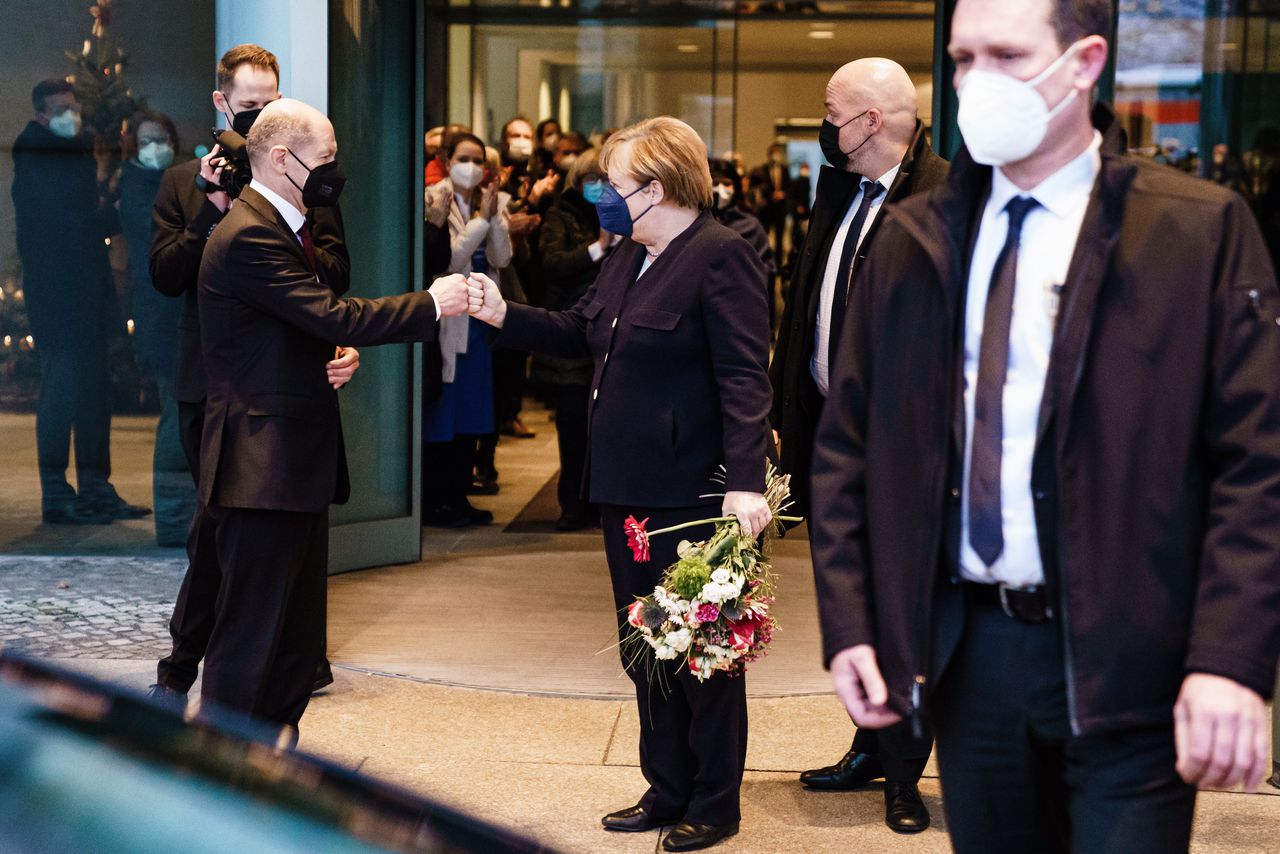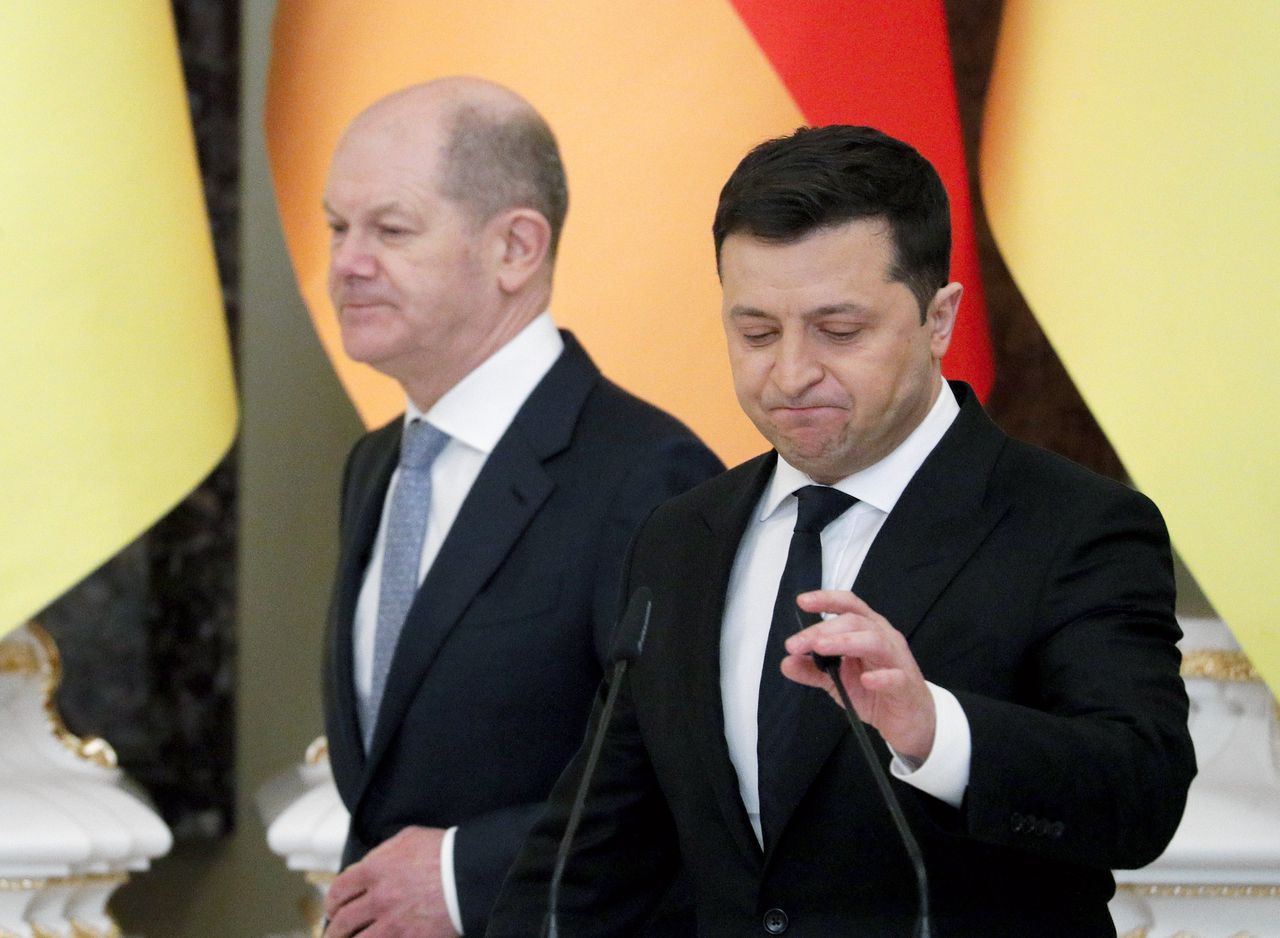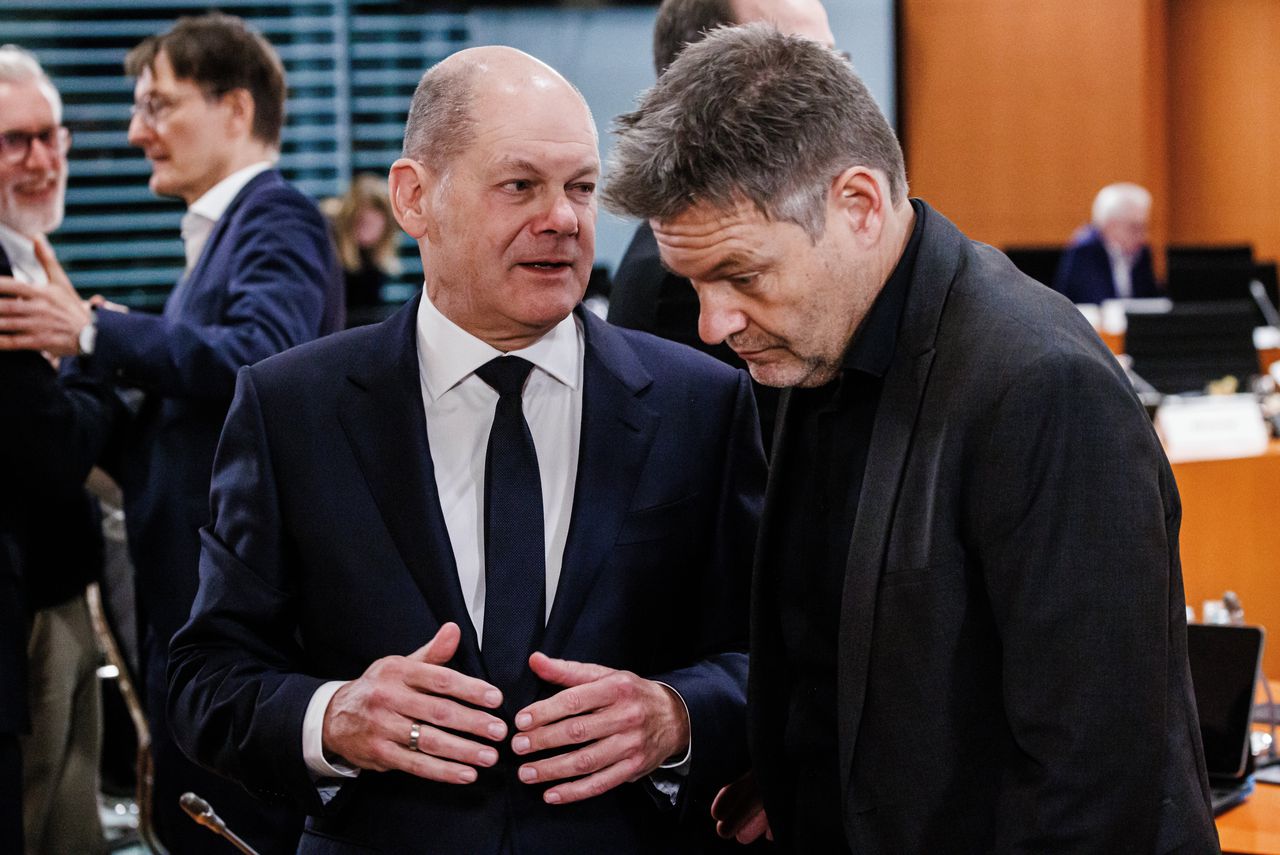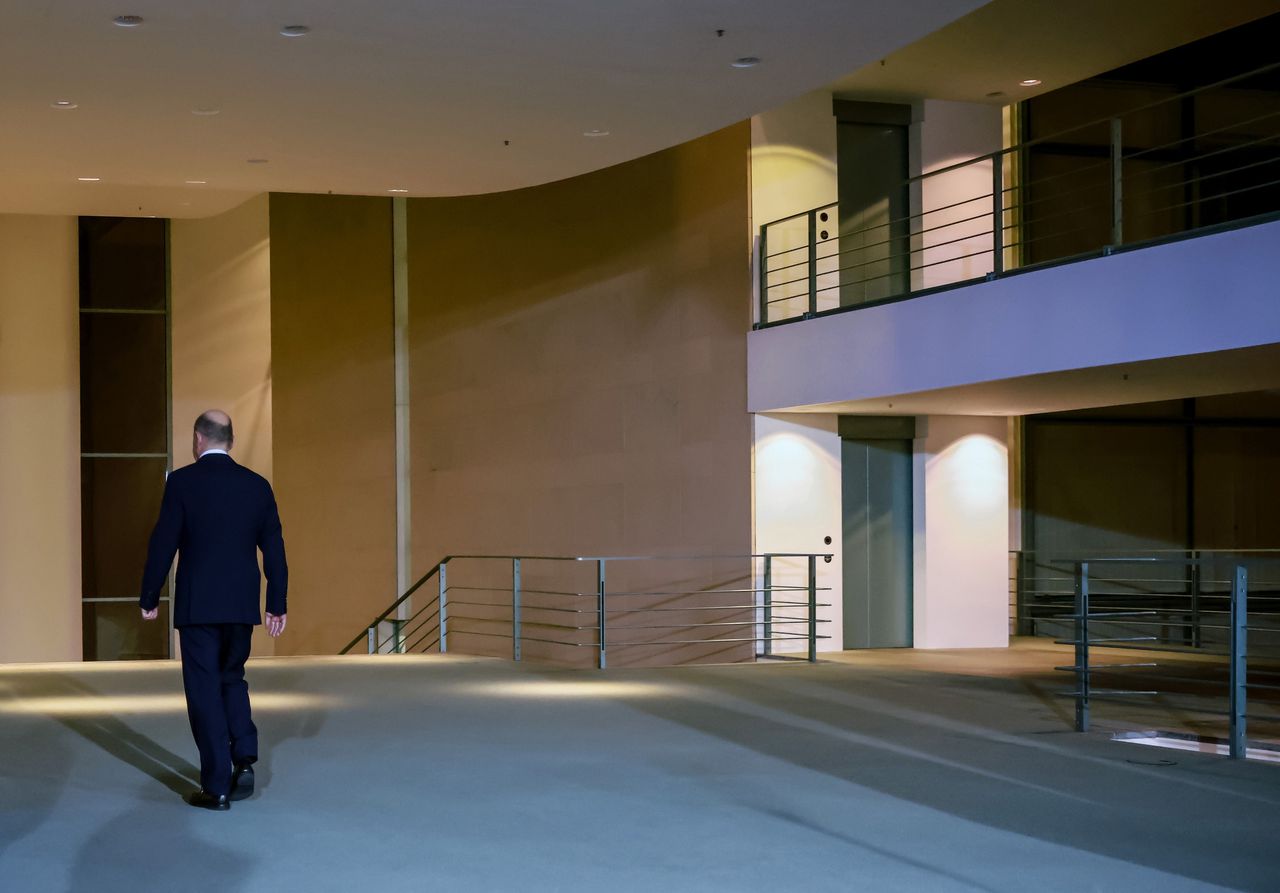Olaf Scholz: The geopolitical hawk of the Zeitenwende failed as head of a troubled coalition
%2Fs3%2Fstatic.nrc.nl%2Fwp-content%2Fuploads%2F2025%2F02%2F24114447%2Fdata128502810-649b69.jpg&w=1920&q=100)
Olaf Scholz is leaving as the figurehead of the SPD: after three years as Chancellor, he is choosing a modest new role as a member of parliament. Scholz (66) managed to lead the SPD to its highest election result in almost twenty years in 2021, but now the Social Democrats have achieved their worst election result ever under his leadership. The negotiations with the CDU/CSU on a new government are being conducted by party leader Alex Klingbeil, who was also appointed SPD parliamentary group leader in the Bundestag on Sunday evening. Scholz does not want to become a minister in a new government.
For three years, der Scholzomat – the nickname he once acquired because of his emotionless way of speaking – was Chancellor of Germany. His term was a year shorter than planned because his difficult coalition of SPD, FDP and the Greens fell prematurely at the end of last year.
Scholz's political career began when he joined the SPD as a young law student from Hamburg and became active in its youth association, Jusos. His vice-chairmanship of Jusos in the 1980s, his Marxist period, is not mentioned in his CV on the government website . Within the SPD, Scholz always fulfilled administrative tasks. After twenty years as a parliamentarian in the Bundestag and a short term as a minister, he returned to Hamburg, where he was a popular mayor from 2011 to 2018. In the previous government of Angela Merkel, Scholz was Minister of Finance and Vice Chancellor.
At the end of 2021, he succeeded Merkel as Chancellor. The Chancellorship of Olaf Scholz in four moments.
Early December 2021 Chancellor
When Scholz was designated as chancellor candidate by his party in August 2020, his chances seemed nil. On the positive side, as finance minister he had contributed to the establishment of the European corona fund and had managed to steer the German economy reasonably well through the corona crisis. However, he was not strong within the SPD; a year earlier he had lost the battle for party chairmanship to a relatively unknown couple that advocated a more left-wing course. Scholz was a centrist within the party, a man without a clear profile. To the outside world he was – and is – a politician without charisma.
A year later, the SPD, with Scholz on the posters, surprisingly topped the polls . There are two explanations for this. The competition was weak: Annalena Baerbock of the Greens was too radical for many voters, Armin Laschet of the CDU/CSU made blunders. What helped Scholz most of all, however, was his presentation as Merkel's equal. Even though he was from a different party, he came from her government and promised stability, something German voters like. He was the safe choice, the experienced leader. Scholz even adopted the so-called 'Merkel diamond', her typical hand gesture, during the campaign. If he had been a woman, he would also have worn her colourful jackets, critics sneered.
On November 24, 2021, the SPD, the FDP and the Greens signed the agreement for their government. On December 8, 2021, Scholz was elected Chancellor by the Bundestag with 395 votes in favor and 303 against.
Ukraine February 2022 Eine Zeitenwende
“We are experiencing a Zeitenwende,” Scholz said in the Bundestag three days after the Russian invasion of Ukraine. We are experiencing a historic turning point, the world will never be the same again. The Zeitenwende speech will go down in history as the moment when Scholz showed himself to be a geopolitical hawk shortly after taking office and turned Germany’s security policy upside down. Two days before the invasion, he had already suspended the commissioning of the Nord Stream 2 gas pipeline. Now he announced that the government would set aside 100 billion euros for defense, and that Germany would make a significant contribution to the armament of Ukraine. Europe was pleasantly surprised by this decisiveness, after sixteen years of caution from Merkel.
In the period that followed, the picture changed. Under Scholz, Germany certainly did not take the lead in supporting Ukraine. For fear of escalation, Scholz refused to supply heavy weapons. Only in January 2023 did he give permission for the delivery of German Leopard 2 tanks , after international pressure. While France and the UK gave permission for Ukraine to use their long-range missiles over Russian territory, Scholz has so far blocked the delivery of the Swedish-German Taurus missile – his opponent Friedrich Merz is willing to supply them.
His reluctance to supply weapons to Ukraine colours Scholz's chancellorship. He hid behind the US, he never wanted to go one step further than (former) President Joe Biden. It also put pressure on the Franco-German relationship, which has deteriorated under Scholz. At the same time, there is also poor communication: after the US, Germany has given the most money to Ukraine in the past period, more than the countries that present themselves as Ukraine's best friends.
Economy November 2023 Budget crisis
When it comes to the German economy, the concept of Schuldenbremse (debt brake) is not far away. The principle, which has been enshrined in the constitution since 2009, prohibits the government from borrowing more than 0.35 percent of GDP, unless there is an emergency. The corona crisis was such an emergency, and the Merkel government set aside 60 billion euros in 2021 to combat it. However, the money turned out not to be needed, and the Scholz government wanted to transfer the 60 billion to an energy transition fund. In November 2023, the Constitutional Court ruled that this transfer was illegal. Scholz was left with a budget deficit of 60 billion euros, the coalition was in crisis .
Foreign investors stayed away due to erratic policies and quarrels between the ruling parties
Using a number of graphs , the British business newspaper Financial Times recently took stock of the German economy under Scholz. The verdict is harsh. His government has failed to stop the economic decline. Foreign investors stayed away due to erratic policies and quarrels between the government parties. The car industry, a pillar of the German economy, is groaning under Chinese competition. The fact that the government stopped subsidies for electric cars at the end of 2023 did not help the manufacturers. The promise to build 400,000 homes per year has not been fulfilled, rents rose sharply. The heating law of Green minister Robert Habeck, intended to replace heating with oil and gas with heat pumps and heating networks, failed due to political wrangling. Only poverty decreased, because benefits went up.
Crucial to economic recovery is a significant increase in public investment, but the Schuldenbremse is in the way . The world's third largest economy is struggling with overdue investments in infrastructure (Deutsche Bahn alone needs 45 billion euros to restore the railways), education, innovation and digitalisation (in 2023, 82 percent of German companies still used a fax machine).
End of November 2024 Government crisis
The budget crisis at the end of 2023 was a prelude to the government crisis a year later. Scholz's chancellorship did not end prematurely due to political quarrels over climate, Ukraine or the election theme of migration, but over money. On the day it became clear that Donald Trump would be the next American president, Scholz dismissed his finance minister , Christian Lindner of the liberal FDP. The FDP withdrew its ministers, the traffic light coalition came to an end.
On December 16, Scholz was expelled by the Bundestag.
The direct cause was a dispute over the budget. The FDP wanted a Wirtschaftswende , including tax cuts, lower benefits, less regulation and maintaining the debt brake. They were on a collision course and knew that the SPD and the Greens could not agree to it. They saw the FDP demands as deliberate sabotage. The underlying problem was the economic crisis – 2024 was the second year of contraction – and the coalition’s inability to develop joint policy. Mutual trust had long since disappeared.
Olaf Scholz, who as party leader managed to keep various ideological factions within the SPD together, was unable to align his politically diverse coalition as chancellor
Olaf Scholz, who previously succeeded as party leader in keeping the various ideological factions within the SPD together, failed as chancellor to get his politically diverse coalition on the same page. Three political colours in one government, unusual in Germany, proved too big a task. His coalition was paralysed by divisions.
In addition, Scholz will be remembered for his technocratic caution, his lack of strong leadership. In the Scholz era, Germany lost its leading role in Europe. The ninth chancellor since 1949 pales in comparison to his predecessors . As the first of four SPD chancellors, after Willy Brandt (1969-1974), Helmut Schmidt (1974-1982) and Gerhard Schröder (1998-2005), his chancellorship will be limited to one term.
Read also
on German division over support for Ukraine/s3/static.nrc.nl/wp-content/uploads/2025/02/07112210/data127589648-291fdc.jpg)
nrc.nl


%2Fs3%2Fstatic.nrc.nl%2Fwp-content%2Fuploads%2F2025%2F02%2F24185334%2Fweb-2402BIN_rechtbank.jpg&w=3840&q=100)
%2Fs3%2Fstatic.nrc.nl%2Fimages%2Fgn4%2Fstripped%2Fdata128534538-112265.jpg&w=3840&q=100)
%2Fs3%2Fstatic.nrc.nl%2Fimages%2Fgn4%2Fstripped%2Fdata128542053-313b41.jpg&w=3840&q=100)
%2Fs3%2Fstatic.nrc.nl%2Fimages%2Fgn4%2Fstripped%2Fdata128542773-952aeb.jpg&w=3840&q=100)
%2Fs3%2Fstatic.nrc.nl%2Fimages%2Fgn4%2Fstripped%2Fdata128538499-e232e5.jpg&w=3840&q=100)